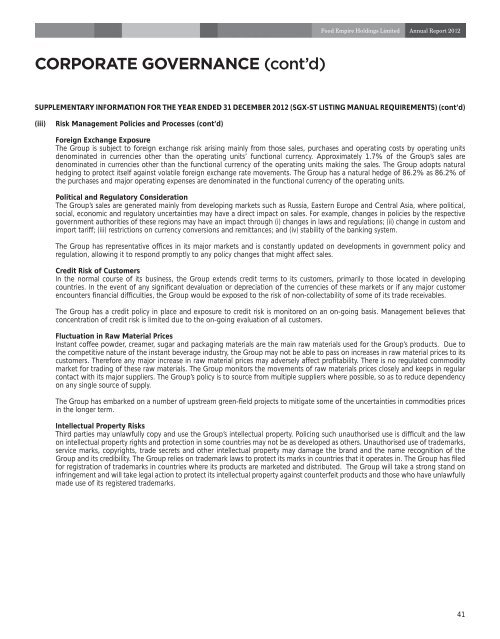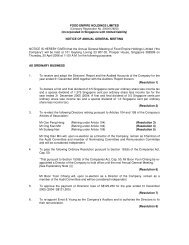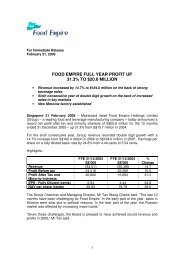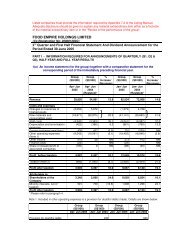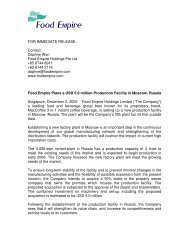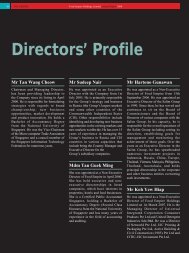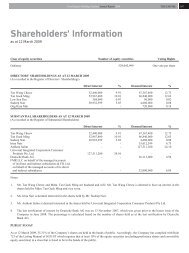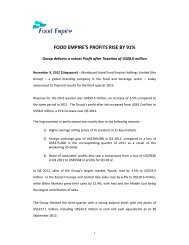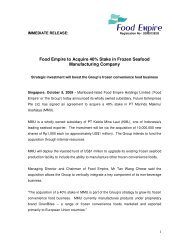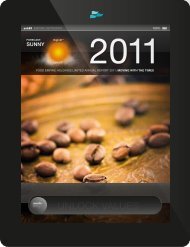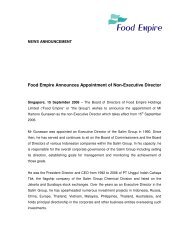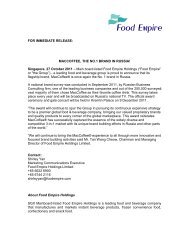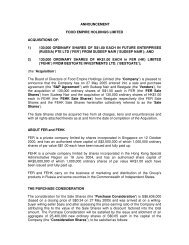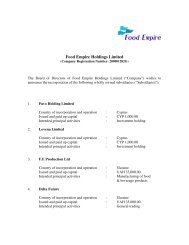notes to the financial statements - Food Empire Holdings Limited
notes to the financial statements - Food Empire Holdings Limited
notes to the financial statements - Food Empire Holdings Limited
You also want an ePaper? Increase the reach of your titles
YUMPU automatically turns print PDFs into web optimized ePapers that Google loves.
<strong>Food</strong> <strong>Empire</strong> <strong>Holdings</strong> <strong>Limited</strong> Annual Report 2012<br />
CORPORATE GOVERNANCE (cont’d)<br />
SUPPLEMENTARY INFORMATION FOR THE YEAR ENDED 31 DECEMBER 2012 (SGX-ST LISTING MANUAL REQUIREMENTS) (cont’d)<br />
(iii)<br />
Risk Management Policies and Processes (cont’d)<br />
Foreign Exchange Exposure<br />
The Group is subject <strong>to</strong> foreign exchange risk arising mainly from those sales, purchases and operating costs by operating units<br />
denominated in currencies o<strong>the</strong>r than <strong>the</strong> operating units’ functional currency. Approximately 1.7% of <strong>the</strong> Group’s sales are<br />
denominated in currencies o<strong>the</strong>r than <strong>the</strong> functional currency of <strong>the</strong> operating units making <strong>the</strong> sales. The Group adopts natural<br />
hedging <strong>to</strong> protect itself against volatile foreign exchange rate movements. The Group has a natural hedge of 86.2% as 86.2% of<br />
<strong>the</strong> purchases and major operating expenses are denominated in <strong>the</strong> functional currency of <strong>the</strong> operating units.<br />
Political and Regula<strong>to</strong>ry Consideration<br />
The Group’s sales are generated mainly from developing markets such as Russia, Eastern Europe and Central Asia, where political,<br />
social, economic and regula<strong>to</strong>ry uncertainties may have a direct impact on sales. For example, changes in policies by <strong>the</strong> respective<br />
government authorities of <strong>the</strong>se regions may have an impact through (i) changes in laws and regulations; (ii) change in cus<strong>to</strong>m and<br />
import tariff; (iii) restrictions on currency conversions and remittances; and (iv) stability of <strong>the</strong> banking system.<br />
The Group has representative offices in its major markets and is constantly updated on developments in government policy and<br />
regulation, allowing it <strong>to</strong> respond promptly <strong>to</strong> any policy changes that might affect sales.<br />
Credit Risk of Cus<strong>to</strong>mers<br />
In <strong>the</strong> normal course of its business, <strong>the</strong> Group extends credit terms <strong>to</strong> its cus<strong>to</strong>mers, primarily <strong>to</strong> those located in developing<br />
countries. In <strong>the</strong> event of any significant devaluation or depreciation of <strong>the</strong> currencies of <strong>the</strong>se markets or if any major cus<strong>to</strong>mer<br />
encounters <strong>financial</strong> difficulties, <strong>the</strong> Group would be exposed <strong>to</strong> <strong>the</strong> risk of non-collectability of some of its trade receivables.<br />
The Group has a credit policy in place and exposure <strong>to</strong> credit risk is moni<strong>to</strong>red on an on-going basis. Management believes that<br />
concentration of credit risk is limited due <strong>to</strong> <strong>the</strong> on-going evaluation of all cus<strong>to</strong>mers.<br />
Fluctuation in Raw Material Prices<br />
Instant coffee powder, creamer, sugar and packaging materials are <strong>the</strong> main raw materials used for <strong>the</strong> Group’s products. Due <strong>to</strong><br />
<strong>the</strong> competitive nature of <strong>the</strong> instant beverage industry, <strong>the</strong> Group may not be able <strong>to</strong> pass on increases in raw material prices <strong>to</strong> its<br />
cus<strong>to</strong>mers. Therefore any major increase in raw material prices may adversely affect profitability. There is no regulated commodity<br />
market for trading of <strong>the</strong>se raw materials. The Group moni<strong>to</strong>rs <strong>the</strong> movements of raw materials prices closely and keeps in regular<br />
contact with its major suppliers. The Group’s policy is <strong>to</strong> source from multiple suppliers where possible, so as <strong>to</strong> reduce dependency<br />
on any single source of supply.<br />
The Group has embarked on a number of upstream green-field projects <strong>to</strong> mitigate some of <strong>the</strong> uncertainties in commodities prices<br />
in <strong>the</strong> longer term.<br />
Intellectual Property Risks<br />
Third parties may unlawfully copy and use <strong>the</strong> Group’s intellectual property. Policing such unauthorised use is difficult and <strong>the</strong> law<br />
on intellectual property rights and protection in some countries may not be as developed as o<strong>the</strong>rs. Unauthorised use of trademarks,<br />
service marks, copyrights, trade secrets and o<strong>the</strong>r intellectual property may damage <strong>the</strong> brand and <strong>the</strong> name recognition of <strong>the</strong><br />
Group and its credibility. The Group relies on trademark laws <strong>to</strong> protect its marks in countries that it operates in. The Group has filed<br />
for registration of trademarks in countries where its products are marketed and distributed. The Group will take a strong stand on<br />
infringement and will take legal action <strong>to</strong> protect its intellectual property against counterfeit products and those who have unlawfully<br />
made use of its registered trademarks.<br />
41


